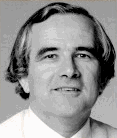 A
Giant Misstep in the War on Cancer? (May 10, 2005)
A
Giant Misstep in the War on Cancer? (May 10, 2005)
|
News & Views item - May 2005 |
![]()
 A
Giant Misstep in the War on Cancer? (May 10, 2005)
A
Giant Misstep in the War on Cancer? (May 10, 2005)
George Miklos has been an advisor to the University of California, Berkeley Drosophila Genome Project and to the human and mouse genome projects at Celera. Currently he is the principal of Secure Genetics, Newport Beach, NSW Australia.
In a "Commentary" in Nature Biotechnology he takes issue with a proposal to sequence human cancer genomes which protagonists such as Harold Varmus former head of the NIH, Eric Lander, founder/director Whitehead Institute/MIT Center for Genome Research (WICGR) and Francis Collins, director of the National Human Genome Research Institute, NIH believe holds out the promise of personalised cures for "each of 50 different cancers." The estimated cost of the project, US$12 billion (A$15.5 billion).
As Dr Miklos describes it, the project "aims to catalogue all somatic mutations from primary tumours as the basis for designer drugs to cure most cancers," but "most patients with a localised primary tumour are cured by surgery and local radiation." The rampant killer is "the metastatic spread of a small population of deadly cells" throughout the body and the cancer genome project as it is currently proposed is, according to Dr Miklos, "fundamentally flawed".
First, the spectrum of mutations of the bulk of the primary tumour cells may only partially overlap with that of its metastatic derivatives and specific therapies developed for the primary tumour may be ineffective in eradicating the metastases. "The clinically significant entity is not the primary tumour per se but the rare cells within it that give rise to metastases" and their particular genetic background.
Second the so-called methylation patterns of genes can change profoundly, causing marked clinical effects but no alteration to the gene's nucleotide sequence.
Dr Miklos concludes that "leading scientists [such as Varmus, Lander and Collins] should think carefully before they tout [the] therapeutic promise [of primary tumour genome sequencing] to patients and politicians," and he dismisses the notion that single mutations in primary tumours are the optimal starting point for research that would lead to the discovery of new more effective cancer drugs.
It is Miklos' belief that "it is not single genes, but rather the properties of aneuploid-based methylated networks that allow metastatic cancer cells to explore novel niches in different different genetic backgrounds and to rapidly become resistant to drug-based therapies."
Put simply searchers after cures for cancer need to learn much more about nature of the beast so as to really understand what they should be trying to do.